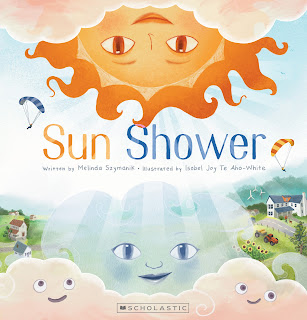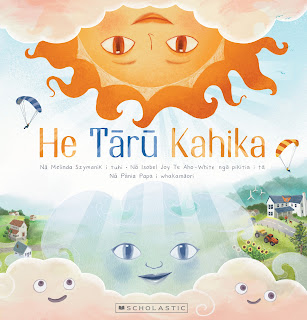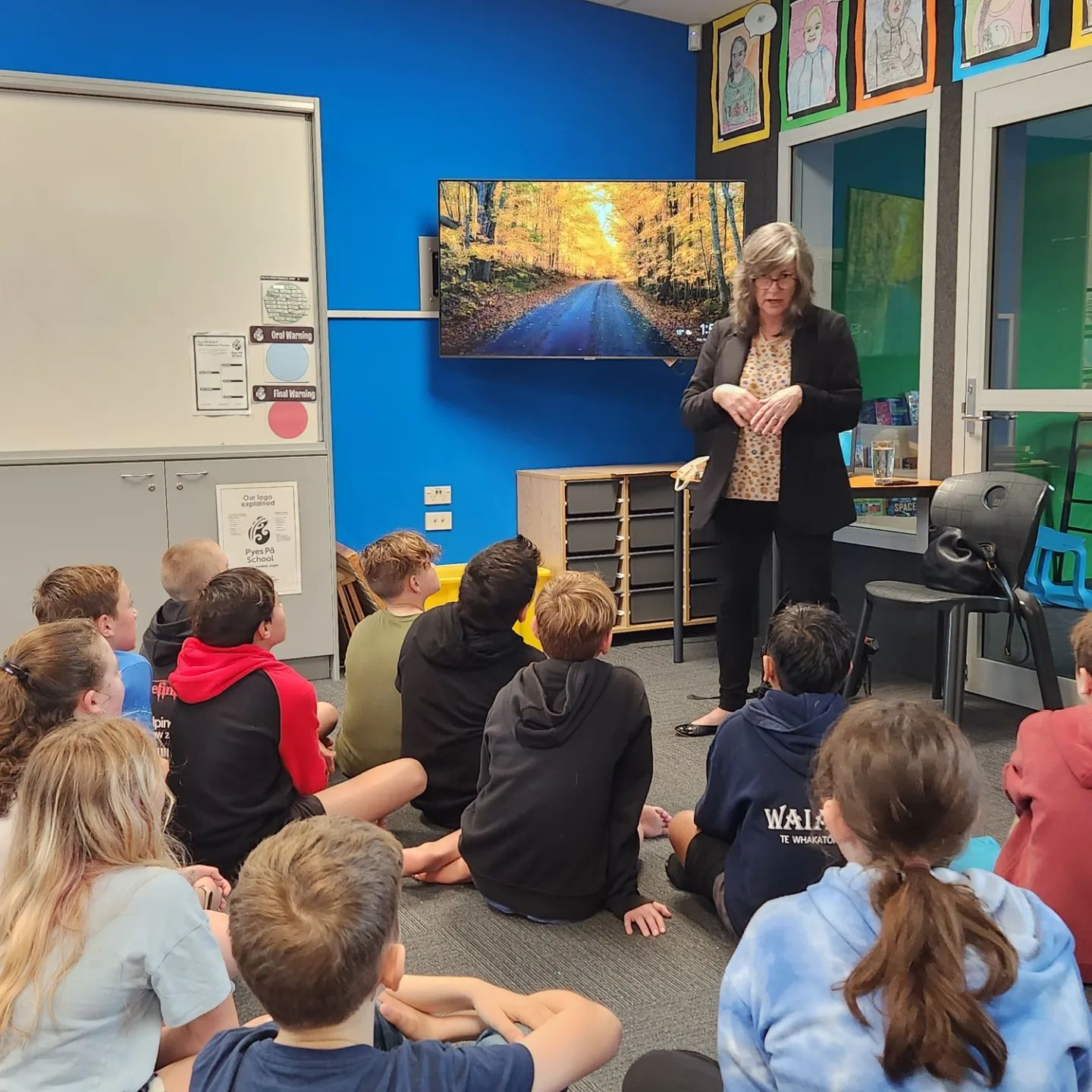I thought I'd share the wild and crazy love letter to libraries I wrote, that I delivered as a talk in December last year. Remember, if you share it, please acknowledge me as the author - thank you :-)
Hello
My name is Melinda Szymanik and I
write books for children. I was born in Auckland to Polish parents and now I live
in Mount Eden. You might know me from such titles as … Sharing with Wolf, A
Winter’s Day in 1939, Time Machine and Other Stories or My Elephant is Blue.
It’s been a tough year this year for
so many of us, for so many reasons. Covid, the increase in the cost of living, war,
tightened budgets, difficulties keeping things afloat with staff sickness and a
lack of funding. And always uncertainty which is very tiring, and doom-scrolling
on twitter which is at times terrifying. Although I have loved connecting with
librarians on twitter. I hope Elon Musk hasn’t killed it completely.
Most
of my talk this evening is going to be a big thank you. Being an author in this
country has some specific challenges to it. I think this is particularly true
when it comes to folk who write for children. I don’t know if you’ve noticed,
but the media are a bit obsessed with sport, especially rugby which apparently
is our national pastime. I’ve even watched the 6 o’clock news covering overseas
curling and corn-hole championships in moments of desperation, rather than
having to talk about books or culture of any kind. There’s almost this
expectation that books and reading will take care of themselves, or that
reading and sports are mutually exclusive, which they are not – I actually saw
a study mentioned in Stuff online today which said, “children
involved in outside-of-school arts activities or individual organised sports
have about twice the odds of reading more frequently and higher odds of
enjoying reading too.”
And do the powers that be believe that
sports needs the media’s help because otherwise it would just be forgotten?
Okay now I’m just sounding like a crazy person.
Children’s books in particular are
just not sexy enough for the main stream media and are only sufficiently click
baity if they’re written by a celebrity or have some grown up scandal attached.
I’m still trying to figure out if there is a ‘safe’ scandal I can have to get
me some exposure. The media seem to
think that children’s writers have children’s brains and don’t actually have
adult thoughts. And that writing for children is so easy everyone can do it with
their eyes closed and we don’t need to talk about how it’s done. Grown up and
celebrated author Martin Amis, when asked if he’d ever thought of writing a
children’s book, famously replied, ‘If I had a serious brain injury I might
well write a children’s book.’ Charming. Anyway, I digress. Suffice it to say we,
and our books, don’t get talked about much in the wider public arena.
I’ve been published for around twenty
years now with over 15 books to my name and a few more on the horizon. I’ve won
a few awards, both here and overseas. But if you stopped someone on the street
and asked them if they recognized my name there would be some pretty awkward
conversations. Although I’d love to be there taking notes which I could then
use in a story, because nothing is ever wasted. Even embarrassment. And I take
comfort knowing at least some of you in this room would have heard of me before
tonight.
As writer Katherine Rundell says in
her lovely wee book, Why You Should Read Children’s Books Even
Though You are So Old and Wise, children’s fiction has a long and noble
history of being dismissed. It is the territory we children’s writers inhabit. Ms
Rundell also said to think of children’s books as literary vodka – it’s a great
little book. Anyway - I have a great support network of writers and
illustrators so it’s not all doom and gloom. You can find us huddled over a
wine and a shared bowl of hot chips muttering about our general obscurity. It’s
pretty hard to compete with David Walliams and the amount of shop frontage that
gets devoted to his many titles. I doubt even his most recent uncouth
swearyness will hurt his bottom line either, because, well, scandal and
celebrity.
But we really, really love what we do.
And we keep doing it despite the difficulties. And the most soul restoring
thing is that you seem to love what we do too. If I get invited to a school, 9
times out of ten it is the school librarian who has made this happen. You see us
and you want the students at your school to see us too. You understand the
impact a visit can have. Research backs you up but you are the ones who know
and who act upon this knowledge and go to great lengths sometimes to do so. I
recently visited an Auckland school and after the visit the librarian kindly emailed
me to say there had been a run on my books in the library. One in particular
was in very hot demand and had a waiting list. All the research is true! Author
visits inspire children to read more. And write too.
Of course responses can vary and
sometimes audiences are fidgety or distracted. And every question at the end is
‘well, actually’ more of a statement. And sometimes that statement isn’t even
about writing or books….good times … But I can guarantee there is always at
least one child in the audience whose life has been changed by the experience.
When I was a kid, it would have been
me.
We didn’t have author visits in
schools back then when Adam was a boy and Noah hadn’t built his ark yet. There
weren’t a lot of children’s books written by New Zealand writers either and I
thought you had to be English or American or Scandinavian to be a writer. It
messed with my writing confidence, and forced my ambitions into hiding for
years. When I got married at the age of 24 my husband didn’t even know I wanted
to be a writer. Sorry James. He’s still holding out hope that one day one of my
books will be an international bestseller and that’ll take care of our
retirement … lol
So just know, your actions, your
efforts to organise author visits are changing the lives of the children at
your school. And you’re helping the writers and illustrators as well and we
see it and we love you for it.
And it’s not just the school visits.
It’s having books by New Zealand
authors in the library and buying their latest title when it comes out even
though the budgets are tight. It’s about supporting and reviewing those books
on blogs and in places like Magpies Magazine or Goodreads or reading reviews
that others have shared. Or just discussing them amongst yourselves. It’s about
joining groups like Storylines and keeping an eye on Notable lists and Book Awards
finalists. It’s about applying for Storylines tour visits or having an award
finalist skype with students. Its organising a kids lit quiz team, or finding
cool new ways to entice reluctant readers to just try this one book because
they might recognize themselves or the place they live in it. What you do is so
important. And every child switched on to reading by your efforts is changed
for life. There are so many spinoff benefits… and, of course, writers and
illustrators need new readers to be made.
I know I’m speaking to the converted.
I don’t need to tell you how wonderful books are or how transformative they can
be in a person’s life. It’s your bread and butter. Although I do worry school
libraries are tarred with the same brush of dismissiveness that surrounds
children’s writers. How else can we understand why libraries have become
vulnerable?
Still …
… no one ever had trouble getting a
book into my hands. As soon as I learnt to read I became a complete
convert to the joy of it. I grew up in a language rich home, surrounded by
books of all kinds. We talked a lot. We read a lot. My dad drove me to the
public library when the school library had run out of things I hadn’t read.
Shout out to Mangere Central Primary School and Mangere East Public Library.
Also to Rosemary Tisdall’s mum, Mrs Bray, may she rest in peace, who was the
librarian at McAuley Girls High School when I was there. I count myself very
lucky for the upbringing I had and the people who helped me with my book
obsession along the way.
I was at a school visit a few years
back, in a mixed year senior primary class and we were finding words associated
with trees for a writing project. None of the students knew what a bud was when
I suggested this as a tree related word. We went outside to look at a tree in
the school grounds where someone promptly broke a branch off and when I showed
them a bud they recognized it for what it was. They just didn’t know the word
for it.
It shouldn’t be about luck.
It should be about school libraries
and the passionate folk who manage them. Because you are the ones who step up
when luck isn’t happening.
From where I stand, school libraries
today seem to be facing several challenges. You know all this but I hope it
helps that I know it too. First there’s the general assault on your existence (the
fact you seem to be an endangered species when you definitely shouldn’t be), and
second there’s the expectation that you will continue to find novel and crafty
ways to convert every child into a reader for pleasure, on less funding and
resources then you had before. I have
been repeatedly bowled over by the innovative ideas school librarians come up
with to do just this.
I’m not sure I have answers to these
problems. Well, I do, but I don’t really have the power to influence the
individuals who make the terrible decisions to reduce the physical space, and
the book and staffing budgets of libraries in schools, without resorting to
something that might get me arrested. Do people chain themselves to the doors
of school libraries like they do to gates and trees and bulldozers when they
are trying to protect the environment from developers? Maybe I have to rethink
my strategy.
There’s been a lot in the news
recently too about declining literacy levels in our youth. There has been talk
of what the educators should do and how the curriculum needs to change but I
can’t help thinking if there was more investment in school libraries, if
librarians were given more resources to promote a love of reading, to expand
their premises and buy a wider range of books to meet the needs of their
students, if libraries were valued and the media was made to talk about books
with the same passion that librarians do then we might not find ourselves in
this situation. I find it hard to fathom that libraries and our support of them
are not centered in the arguments for helping improve literacy. A while back
we, as a country, seem to have dropped the ball on loving and talking about
books – maybe it was in the eighties when the free market economy began to
emerge. Certainly we look back on the eighties as the golden days of children’s
literature and the children’s book community thought we were about to see an
explosion of NZ children’s writers onto the international stage. How wrong we
were. Instead we somehow disconnected the skill of reading from the joy of
reading. Except in libraries. You are the rebel bases as the book oblivious Empire
seeks universal control. And I certainly appreciate your quiet rebellion. And
that’s something else we writers talk about huddled over our wine and chips.
Please know that we love you and the work you do. We recognize its importance
and the need to act to keep it not just alive, but in good health. School
libraries are an essential service and only school librarians can get the most
out of them. We’re on the same team, trying to find ways to spark that joy of
reading. And we are here for this rebel alliance.
So thank you from the bottom of my
heart. From our hearts. We acknowledge and appreciate everything you do.
As for me personally this year? I have
three (maybe four – fingers crossed), picture books coming out with Scholastic
and Penguin over the next two years. One is about the clouds helping the sun
and the rain to make friends. One is about what happens when the darkness runs
away, and one is about a monster learning to love books and it features a
librarian at the end.
I haven’t been able to write anything
novel length for a while. Maybe it’s the weight of the pandemic, and the cost
of living, and the challenges of the last few years, or maybe it’s just me. I
think I’ll find my way back to the longer form eventually. And I haven’t been
idle. Instead I’ve been challenging myself by writing in a different arena.
I’ve been writing poetry. For both adults and children. The adult stuff is tricky
but crikey, I find children’s poetry a lot harder. Still, I think I’m getting
the hang of it and I’m getting some things published. And I’m still writing
picture books as well.
I’ve been working more on the other
side of things too. For the past three years I’ve been a trustee on the New
Zealand Book Awards Trust and this year I became the Auckland, Northland, and Waikato
representative on the New Zealand Society of Authors National Board. Partly
I’ve gotten involved because books deserve way more attention in this country
and I will try any avenue that might help change this. I hope this might help
you too.
And we really need to stop dismissing
children’s literature. As if children are only concerned by the trivial. As if
children’s books are just fart jokes and ridiculous plots. It always frustrates
me that adults can dismiss children’s books so easily because I am always working
hard to put things into my books to entertain or inspire the adult reader as
well as the young reader. Where possible my stories also have layers so that
the book can grow with the growing child. My picture book Fuzzy Doodle can be
read as a straight story of metamorphosis, the larva to the caterpillar to the
chrysalis to the butterfly, but it’s also the story of how we make art whether
its music or stories or pictures. There is a vast world inside that chrysalis
as the scribble transforms. Like the process of becoming a reader. A mystery. A
magic. Where the whole is so much more than the sum of its parts. Which is what
the best books for children are. Mystery, magic and just a bit like the Tardis.
But you already know that, partly perhaps because you work in a place that is a
bit mystery, a bit magic and a whole lot like the Tardis too.
I think I’ll finish by reading My
Elephant is Blue. I wrote this after receiving some bad news which
pushed me into a bit of a depression. But writing the story pulled me out of it
again. Because that’s what story can do.
Being read to is good for all of us and I think after a very trying year it’s
nice to hear a quietly hopeful message.



